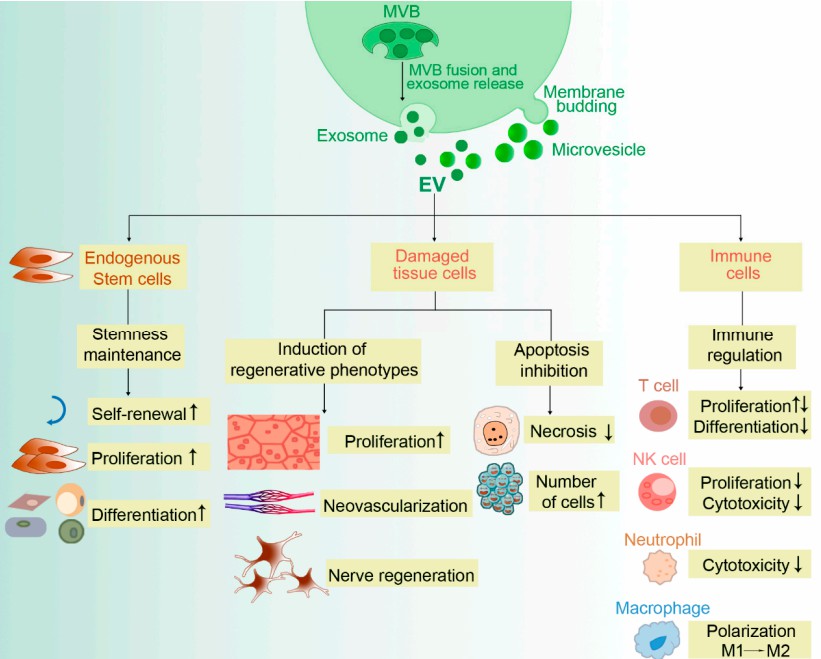Stem Cell-derived Exosome
- Advantages and Applications
Overview Services Features FAQs
Creative Biolabs offers a comprehensive service for SC-Exo (Stem cell exosomes) advantage and application research, opening up greater application prospects.
 Fig. 1 Molecular mechanisms of stem cell-derived EVs.1
Fig. 1 Molecular mechanisms of stem cell-derived EVs.1
Overview
SC-Exo, as a vehicle for information exchange between SCs (stem cells) and other tissue cells, is poised to become one of the new frontiers in biomedical research. Different from SCs, SC-Exo does not respond to a damaged microenvironment but can regulate apoptosis, growth, proliferation, and differentiation pathways by altering the extracellular matrix and changing the transcriptome and proteome of the recipient cells.
SC-Exo Related Services
-
Isolation and Characterization: Utilizing advanced techniques to extract SC-Exosomes and further comprehensive characterization including size distribution, concentration, and molecular composition.
-
Functional Analysis:
Bioactivity Assays: Evaluating the biological effects of SC-Exosomes on target cells, including proliferation, migration, and differentiation assays.
Mechanistic Studies: Examining the molecular interactions and signaling pathways that underlie the mechanisms of action.
-
Custom Exosome Engineering:
Surface Modification: Tailoring exosome surface properties for enhanced targeting and delivery.
Cargo Loading: Loading specific therapeutic agents or nucleic acids into exosomes for targeted delivery.
-
Preclinical Support: Supporting animal models used to assess safety and efficacy.
SC-Exo Features
Maintaining Cell Stemness Advantage and Application of SC-Exo
SCs can self-renewal and direct differentiation, and maintaining their stemness is essential for their functional activity. SC-Exo are the primary mediators of SCs paracrine action and contain SCs bioactive substances that can replace SCs and maintain cell stemness. Notably, the application of SC-Exo also avoids the risks of tumorigenicity, pro-inflammation, and host rejection in SC transplantation.
Inducing Regeneration Advantage and Application of SC-Exo
SC-Exo can wrap nutrients and a large number of cell-regulated signals to penetrate deep into cells and strengthen the barrier, with excellent anti-inflammatory and regenerative effects. For a variety of inflammatory skin conditions, including psoriasis and atopic dermatitis, SC-Exo may prove to be a safe and effective treatment. In addition, SC-Exo has shown encouraging therapeutic effects in several different types of tissue-damaging diseases, including kidney injury, heart injury, brain injury, and liver and lung injury.
Inhibiting Cell Apoptosis Advantage and Application of SC-Exo
The ability of SC-Exo to inhibit apoptosis is not significantly different from that of their parent cells. One of the mechanisms has been identified to inhibit apoptosis through upregulation of anti-apoptotic genes such as Bcl-XL and downregulation of pro-apoptotic genes such as Casp1, as well as activation of extracellular signal-regulated kinases to enhance cell proliferation.
Regulating Immune Responses Advantages and Applications of SC-Exo
Several immune cell types, such as dendritic cells, T cells, B cells, and macrophages, are immunomodulated by SC-Exo. For example, SC-Exo reduces the expression of macrophage chemotactic protein CX3CL1 and tumor necrosis factor, and also inhibits the activation and infiltration of CD4+ T and CD8+ T cells, thereby decreasing the local inflammatory response and reducing pathological damage in multiple organs.
Promoting Angiogenesis Advantage and Application of SC-Exo
To boost angiogenic potential, SC-Exo upregulates angiogenesis-related genes like VEGF and HIF-1α. Secondly, miR-30b and miR-210 could be delivered to promote angiogenesis. In addition to the microRNA-mediated effects carried, the transfer of exosomes carrying Wnt4 to human-derived venous endothelial cells can activate β-Catenin protein function, thus promoting angiogenesis. Umbilical cord-derived SC-Exo has also been found to have coagulation-inducing properties in vitro.
Creative Biolabs not only analyzes the physical and biochemical properties of SC-Exo such as particle concentration, particle size distribution, drug loading, proteins, and nucleic acids but also provides quality control of the production process to improve drug loading efficiency. Our SC-Exo services are available throughout the entire process of mass manufacturing, isolation and purification, and profiling, greatly accelerating the research process for clients. Please contact us with your interest.
FAQs
Q: How are SC-Exosomes isolated?
A: SC-Exosomes can be isolated using techniques such as ultracentrifugation, filtration, or affinity-based methods. These processes separate exosomes from other cell components and ensure a high purity of the isolated exosomes.
Q: What are the main benefits of applying SC-Exosomes to treatment?
A: The main advantages include their regenerative potential, immunomodulatory effects, low immunogenicity, and versatility in targeting various diseases and conditions.
Q: Can SC-Exosomes be engineered for specific applications?
A: Yes, SC-Exosomes can be engineered by modifying their surface properties or loading them with therapeutic agents to enhance their targeting ability and efficacy.
Q: What uses are SC-Exosomes now being made in medicine and research?
A: SC-Exosomes are being explored for use in regenerative medicine, cancer therapy, neurological disorders, and cardiovascular diseases, among other applications.
Q: Is employing SC-Exosomes accompanied by any risks?
A: Although SC-Exosomes are generally thought to be safe and have low immunogenicity, more research is required to completely comprehend their possible hazards and long-term impacts.
Reference
-
Yin, Lei, et al. "Therapeutic advances of stem cell-derived extracellular vesicles in regenerative medicine." Cells 9.3 (2020): 707. Under Open Access license CC BY 4.0. The image was modified by revising the title.
For Research Use Only. Cannot be used by patients.
Related Services:

 Fig. 1 Molecular mechanisms of stem cell-derived EVs.1
Fig. 1 Molecular mechanisms of stem cell-derived EVs.1









